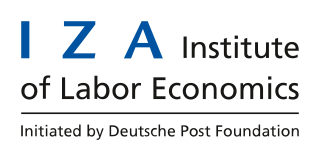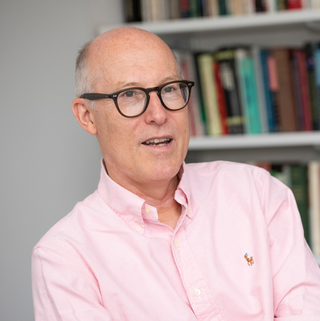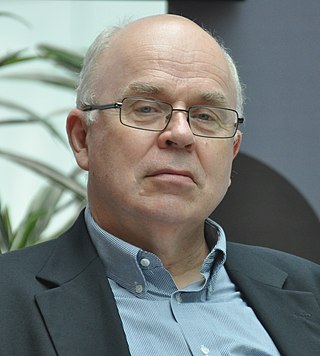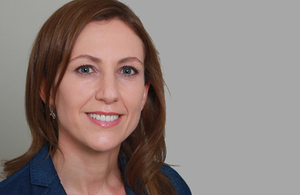Jean-Jacques Marcel Laffont was a French economist specializing in public economics and information economics. Educated at the University of Toulouse and the Ecole Nationale de la Statistique et de l'Administration Economique (ENSAE) in Paris, he was awarded PhD in economics by Harvard University in 1975.

Jean Tirole is a French economist who is currently a professor of economics at Toulouse 1 Capitole University. He focuses on industrial organization, game theory, banking and finance, and psychology. In particular, he focuses on the regulation of economic activity in a way that does not hinder innovation while maintaining fair rules.

The IZA - Institute of Labor Economics, until 2016 referred to as the Institute for the Study of Labor (IZA), is a private, independent economic research institute and academic network focused on the analysis of global labor markets and headquartered in Bonn, Germany.

Sir Timothy John Besley, is a British academic economist who is the School Professor of Economics and Political Science and Sir W. Arthur Lewis Professor of Development Economics at the London School of Economics (LSE).

Sir Richard William Blundell CBE FBA is a British economist and econometrician.

Nobuhiro Kiyotaki FBA is a Japanese economist and the Harold H. Helms '20 Professor of Economics and Banking at Princeton University. He is especially known for proposing several models that provide deeper microeconomic foundations for macroeconomics, some of which play a prominent role in New Keynesian macroeconomics.
John Halstead Hardman Moore CBE FBA FRSE is an economic theorist. He was appointed George Watson's and Daniel Stewart's Chair of Political Economy at the University of Edinburgh School of Economics in 2000. In 2018 he was appointed the David Hume University Professor at the University of Edinburgh. Previously, in 1983, he was appointed to the London School of Economics, where in 1990 he became Professor of Economic Theory, a position he still holds.
John Michael Van Reenen OBE is the Ronald Coase School Professor at the London School of Economics. He is also Director of the Programme On Innovation and Diffusion (POID) at the Centre for Economic Performance. He was appointed an Officer of the Order of the British Empire (OBE) and received the Yrjö Jahnsson Award.

Armin Falk is a German economist. He has held a chair at the University of Bonn since 2003.

Seppo Mikko Sakari Honkapohja is a Finnish economist. He is a board member of the Bank of Finland and former Professor of International Macroeconomics of the University of Cambridge.

The International Growth Centre (IGC) is an economic research centre based at the London School of Economics, operated in partnership with University of Oxford's Blavatnik School of Government.
The Yrjö Jahnsson Foundation is a charitable foundation whose aims are to promote Finnish research in economics and medicine and to maintain and support educational and research facilities in Finland. It was established in 1954 by the wife of Yrjö Jahnsson, Hilma Jahnsson. It supports the award of the Yrjö Jahnsson Award and Yrjö Jahnsson Lecture series. These lectures have been delivered by noteworthy economists since 1963. 10 of the Yrjö Jahnsson Lecture series scholars have gone on to win the Nobel prize in economics, making it a top predictor for future recipients.

Robin Burgess is a British economist who is Professor of Economics, Co-founder and Director of the International Growth Centre, as well as Co-Founder and Director of the Economics of Energy and the Environment (EEE) program at the London School of Economics and Political Science.
Hélène Rey is a French economist who serves as Professor at London Business School (LBS). Her work focuses on international trade, financial imbalances, financial crises and the international monetary system.

María Silvana Tenreyro is a British-Argentine economist who is professor of Economics at the London School of Economics and served as an external member of the Bank of England's Monetary Policy Committee from July 2017 to July 2023. She served as the president of the European Economic Association for 2021.
Michèle Tertilt is a German professor of economics at the University of Mannheim. Before, Tertilt was an assistant professor at Stanford University. She also spent a year at the University of Pennsylvania and one year as a research fellow at the Hoover Institution. She is currently a director of the Review of Economic Studies and associate editor of the Journal of Development Economics. In 2017 she received the Yrjö Jahnsson Award – a biennial award by the European Economic Association and the Yrjö Jahnsson Foundation to a European economist no older than 45 years, who has made a contribution in theoretical and applied research that is significant to economics in Europe. In September 2013 she was awarded the Gossen Prize – an annual award by the Verein für Socialpolitik which recognizes the best published economist under 45 working in the German-speaking area. Tertilt is the first woman to win this prestigious German prize in economics. In 2019, she was awarded the Gottfried Wilhelm Leibniz Prize by the Deutsche Forschungsgemeinschaft. Her main focus is around development and intra-family interactions. She has also worked on consumer credit and bankruptcies.
Nava Ashraf is a Canadian economist who is a professor of economics at the London School of Economics as well as research director of the Marshall Institute for Philanthropy and Social Entrepreneurship. Her research interests include development economics, behavioral economics, and family economics.
Imran Rasul is a British economist and academic. He is Professor of Economics at the University College London, managing editor of the Journal of the European Economic Association, and co-director of the Centre for the Microeconomic Analysis of Public Policy at the Institute for Fiscal Studies. His research interests include labour, development and public economics and he is considered to be one of the leaders within social norms and capital economics.

The UCL Department of Economics is one of nine Departments and Institutes within the Faculty of Social and Historical Sciences at University College London. It is the oldest department of economics in England and is research-intensive, currently headed by Professor Antonio Guarino.
The Bureau for Research and Economic Analysis of Development (BREAD) is a professional association founded in 2002 to encourage research and scholarship in development economics. The association organizes conferences and seminars, disseminates a working paper series, and maintains a network of fellows and affiliates. The current presidents are Pascaline Dupas and Imran Rasul.













